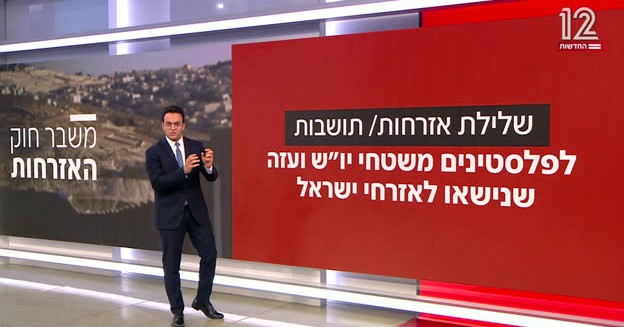Prime Minister Naftali Bennett held consultations on Monday, June 21, with senior ministers and the head of the Islamist party Ra’am to hammer out a compromise on the renewal of the Nationality and Entry into Israel Law (Temporary Order) – 2003. The meeting ended with no breakthrough on the issue, Channel 12 reported on Monday night. The parties agreed on the importance of coalition unity, but failed to resolve the deadlock on this specific issue.

The coalition meeting on the racist “family reunification law” ended with no breakthrough, Channel 12 reported on Monday night. The slide to the right reads: “Denial of citizenship / permanent residence for Palestinians from the Judea, Samaria and Gaza (occupied territories) who are married to citizens of Israel. (Screen shot: Channel 12)
For years, Hadash has opposed the legislation, which prevents Palestinians from entering Israel for the purposes of family reunification, as racist violation of fundamental human rights – the right to equality and the right to family. The law affects thousands of Palestinian families comprising tens of thousands of individuals on both sides of the Green Line, preventing Palestinians from the territories from legally residing in Israel to live together with their spouses.
In 2003, Israel enacted an amendment to the Citizenship and Entry into Israel Law as a temporary “emergency regulation.” The context of its introduction was the Second Intifada during which dozens of suicide bombings were committed inside Israel. In at least one case, a suicide bomber from the territories carried an Israeli identity card pursuant to procedures of family unification with Israeli citizens or residents. To prevent a recurrence of this type of incident, or of Palestinians from the territories who carried Israeli ID cards assisting, willingly or by coercion, in the commission of such acts, the emergency amendment was originally enacted for a period of one year. However, it has repeatedly been renewed ever since and is now, for all intents and purposes, a permanent law. The latest renewal of the order is due to expire on July 6.
The Knesset vote to renew the amendment had been scheduled for June 21, but was delayed in view of Joint List opposition and objections by coalition party Ra’am as well as lawmakers of Meretz and Labor. The right-wing opposition parties, although ideologically on board with renewing the order, rebuffed coalition efforts to ensure their support, arguing that their job was to unseat the new government, not help it.
Hadash, the Joint List and Meretz as well as human rights organizations have challenged the amendment’s constitutionality on numerous occasions without success. Rather, until now, its renewal has been approved with broad support from the right and some Labor MKs, who apparently see it, years after its original enactment for security reasons, as one of the weapons in Israel’s arsenal for defending the Zionist state’s “demographic dominance.” By systematically undermining the fundamental human right of Palestinian citizens of Israel, as well as those from the occupied territories, regarding whom they may marry and if and where the couple may live together with their children as a family, for many Palestinian couples the “temporary order” makes their domestic lives untenable, and provides yet one more reason to emigrate.
Related:
- MK Odeh Warns of New Israeli PM’s Extreme Right-Wing Ideology
- MK Barakeh: “High Court Gives Stamp of Approval to Racist Law”
- Gov’t Approves Racist Law against Unification of Palestinian Families
- Knesset Enacts Totalitarian Terror Bill; Extends Racist “Citizenship and Entry into Israel” Provision
- Knesset Extends Racist Law Banning Reunification of Palestinian Families


